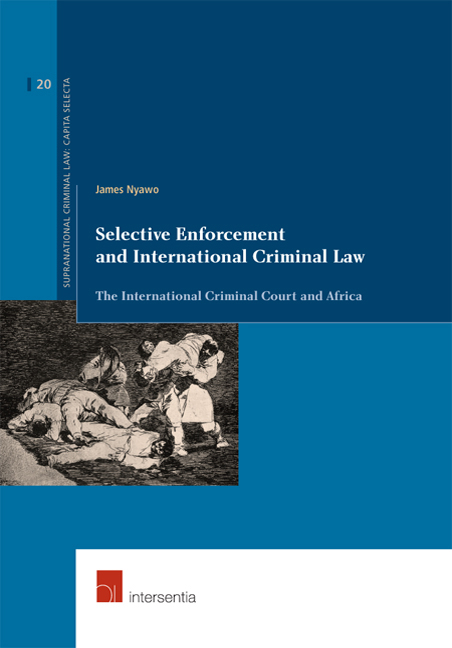Book contents
- Frontmatter
- Dedication
- Preface
- Acknowledgements
- Contents
- Epigraph
- Chapter 1 Introduction
- Chapter 2 The Establishment of the International Criminal Court, and Africa's Role and Early Support
- Chapter 3 The Office of the Prosecutor and the Politics of Selecting Targets for Prosecution
- Chapter 4 State Party Referrals, UN Security Council Referrals and the Selection of Situations
- Chapter 5 Assessing Selective Enforcement from an Admissibility Perspective
- Chapter 6 The AU and African States’ Shift from Cooperation to Non-Cooperation with the Court
- Chapter 7 African States’ Reaction to the AU's Call for Non-Cooperation with the Court
- Chapter 8 Africa and the International Criminal Court: The Lessons and Prospects
- Bibliography
- Index
- Frontmatter
- Dedication
- Preface
- Acknowledgements
- Contents
- Epigraph
- Chapter 1 Introduction
- Chapter 2 The Establishment of the International Criminal Court, and Africa's Role and Early Support
- Chapter 3 The Office of the Prosecutor and the Politics of Selecting Targets for Prosecution
- Chapter 4 State Party Referrals, UN Security Council Referrals and the Selection of Situations
- Chapter 5 Assessing Selective Enforcement from an Admissibility Perspective
- Chapter 6 The AU and African States’ Shift from Cooperation to Non-Cooperation with the Court
- Chapter 7 African States’ Reaction to the AU's Call for Non-Cooperation with the Court
- Chapter 8 Africa and the International Criminal Court: The Lessons and Prospects
- Bibliography
- Index
Summary
A major controversy that has arisen during the International Criminal Court's first decade has been the issue of selective enforcement of international criminal law. This has been prompted by the Court failing to open investigations or prosecutions outside Africa. This book assesses the claims of this nature made against the Court – primarily by some African leaders and ruling elites – and how the criticism has impacted on the role of the Court as a mechanism for promoting the international rule of law. The assumption is that if the claims that the Court, based in The Hague, the Netherlands, focuses selectively on Africa are valid, then the Court's role as an effective mechanism for promoting the international rule of law could be called into question.
The book analyses three key components of the Court's legal framework – the mechanisms that trigger the Court's jurisdiction, admissibility rules and the independence of the Office of the Prosecutor – in order to establish how the Court became engaged in Africa and its problems. It argues that the Court's broad, yet not universal, jurisdiction means that it is expected to intervene in other regions apart from Africa. However, when African politicians and members of the ruling elite claim that the Court is selectively focusing on Africa, they mean that it is targeting sitting heads of state and other government officials, to the exclusion of their political rivals or ordinary citizens.
The underlying theme that emerges from this analysis is that the Court is a victim of realpolitik both at the global and state levels. At the global level, powerful states, particularly the permanent members of the United Nations (UN) Security Council, seek to utilise the Court to further their own interests against those states that they consider to be against their own hegemonic interests. At the state level, the ruling elites tend to be comfortable with the Court as long as it targets their political competitors, but are willing to mobilise state apparatus to frustrate the Court if they become the focus of the Court's interventions. Still, since there is no contestation on the principle of ending impunity for atrocity crimes which the Court stands for, perhaps African states have to first play their primary role through their domestic jurisdictions and deny the ‘politicised Court’ any room for intervention.
- Type
- Chapter
- Information
- Selective Enforcement and International Criminal LawThe International Criminal Court and Africa, pp. vii - viiiPublisher: IntersentiaPrint publication year: 2017



